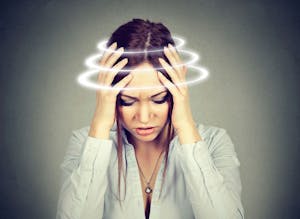
Unfortunately, many balance disorders start suddenly and with no obvious cause.
Common Diagnoses We Work With Include:
- Central Nervous System Disorders
- Neuropathy
- Age-Related Balance Dysfunction
- Oculomotor (Visual) Dysfunction
- Benign Paroxysmal Positional Vertigo (BPPV)
- Labyrinthitis
- Ménière's Disease
- Vestibular Neuronitis
- Muscle Atrophy
- Nerve Injuries
Treatment for Balance Disorders
There are more than a dozen causes of dizziness and many reasons why you might have difficulty with your balance.
Treatment of balance & dizziness disorders can be very complex. Nevertheless, we have helped numerous residents in the community cope with or recover from conditions that cause balance disorders.
The first thing your doctor will do if you have a balance problem is determine if another health condition or a medication is to blame. If so, your doctor will treat the condition, suggest a different medication, or in many cases, refer you to one of our balance disorder experts here at 3D PT.
How Our Physical Therapists Can Help
Physical therapist directed treatment can assist patients with balance disorders in a number of ways. As experts in the evaluation and treatment of movement, muscle, joint, and nervous system disorders, our physical therapists can prescribe and implement a variety of treatments including:
- Coordination Exercises
- Proprioception Exercises
- Strengthening Exercises
- Stretching and Range of Motion Exercises
- Posture Exercises
- Retraining of the Inner Ear
- Visual Tracking Training
Three Additional and Important Treatment Options
Reduce Fall Risk. Your physical therapist will assess problem footwear and hazards in your home that increase your risk of balance problems or falling. Household hazards include loose rugs, poor lighting, unrestrained pets, or other possible obstacles.
Reduce Fear of Falling. By addressing specific problems that are found during the examination, your physical therapist will help you regain confidence in your balance and your ability to move freely, and perform daily activities. As you build confidence in your balance and physical ability, you will be better able to enjoy your normal daily activities.
Care Collaboration. Working in collaboration with your medical doctor, allows you to get two expert opinions and assessments of your condition. Together, we can better address your balance disorders and decrease your fear of falling and fall risks.
Positional Vertigo - A Common Cause of Dizziness & Balance Disorders
If you have BPPV (benign paroxysmal positional vertigo), our vestibular therapy experts can perform a series of simple movements, such as the Epley maneuver, which can help dislodge the otoconia (calcium crystals) from the semicircular canal of the ear. In many cases, one session works; other people need the procedure several times to relieve their dizziness.
When should I seek help if I think I have a balance disorder?
To help you decide whether to seek medical help for a dizzy spell, ask yourself the following questions. If you answer "yes" to any of these questions, talk to one of our physical therapists and your doctor:
- Do I feel unsteady?
- Do I feel as if the room is spinning around me?
- Do I feel as if I'm moving when I know I'm sitting or standing still?
- Do I lose my balance and fall?
- Do I feel as if I'm falling?
- Do I feel lightheaded or as if I might faint?
- Do I have blurred vision?
- Do I ever feel disoriented–losing my sense of time or location?
